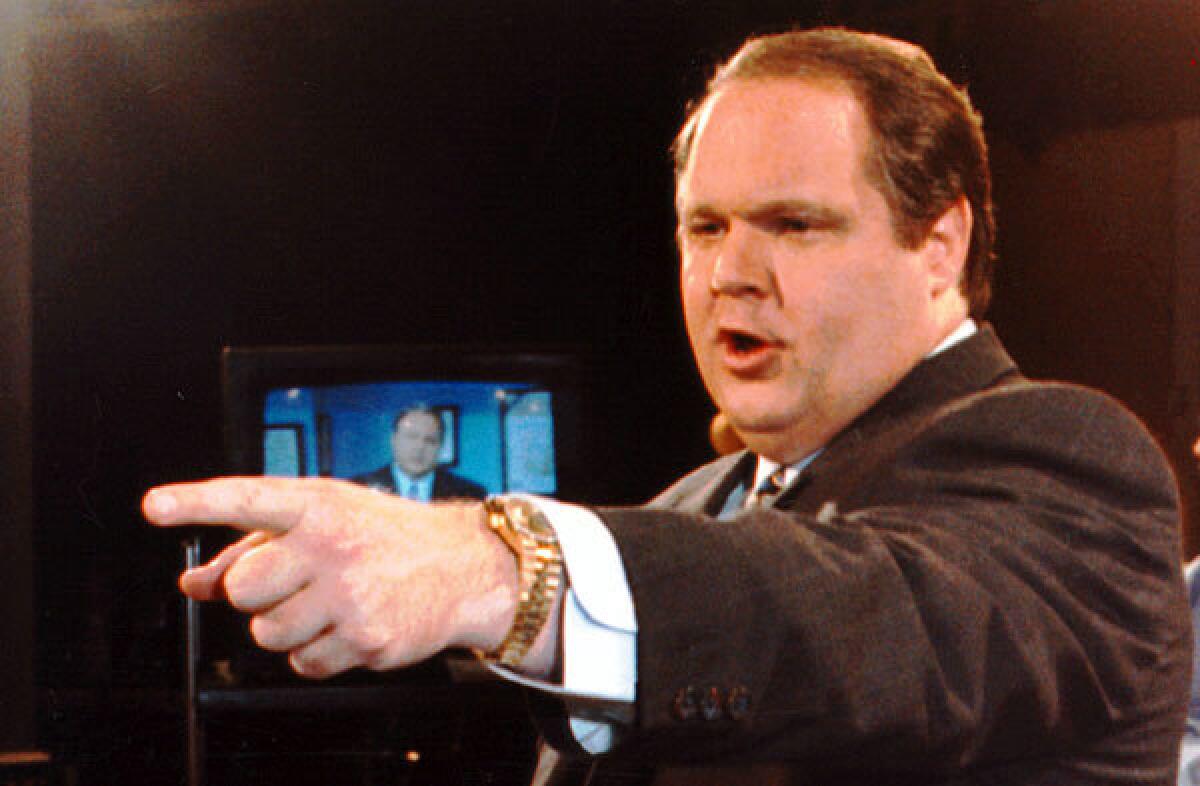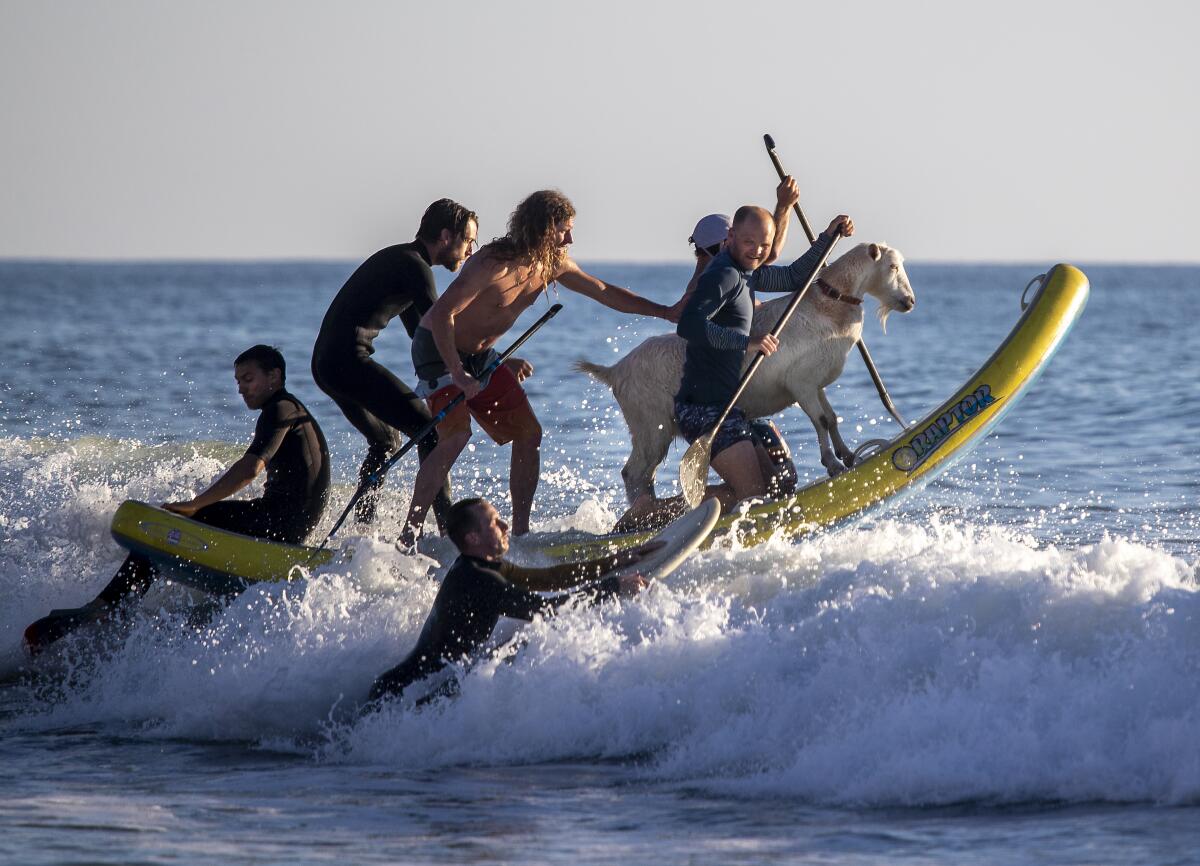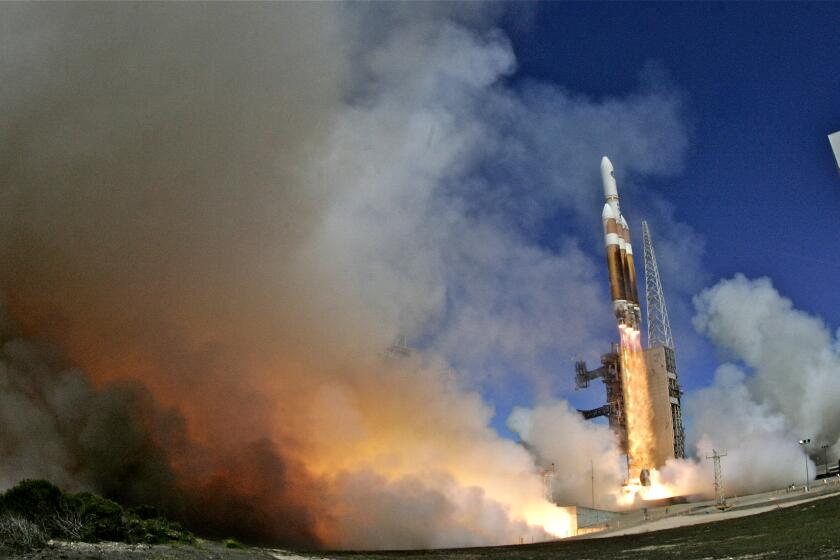Essential California: Rush Limbaugh’s Sacramento rise

Good morning, and welcome to the Essential California newsletter. It’s Thursday, Feb. 18, and I’m writing from Los Angeles.
Sign up for Essential California
The most important California stories and recommendations in your inbox every morning.
You may occasionally receive promotional content from the Los Angeles Times.
Rush Limbaugh was not, in the literal sense, born in California. The conservative talk radio host, who died Wednesday at 70, hailed from Cape Girardeau, Mo.
But one could argue that Limbaugh’s on-air persona was forged in the Golden State, where a nearly four-year stint on the Sacramento airwaves altered the course of his career.
[See also: “Rush Limbaugh, highly influential conservative radio host, dies at 70” in the Los Angeles Times]
Long before Limbaugh built an unprecedented national media platform, before he was deemed an honorary member of the Republican congressional delegation, before he helped bring conspiracy theories and racist, misogynistic vitriol into mainstream political discourse, he was a desperate 33-year-old guy who had all but given up on his broadcast dreams.
It was 1984, and young Limbaugh had been fired from at least five stations in three cities. He’d even left radio for a few years, and then returned — only to be fired once again after less than a year at KMBZ in Kansas City. At the time, he was “mired in loneliness and aimlessly walking through life,” as he recalled years later.
But a racist joke told on-air halfway across the country would soon set the stage — and, in retrospect, perhaps the tone — for his meteoric rise.
The 9-a.m.-to-noon slot at a middle-of-the-pack AM radio station in Sacramento was no aspirant’s idea of a dream job. But the KFBK position was newly vacant and offered Limbaugh one last shot at trying to make it on-air. (The station’s previous morning conservative talk radio host had resigned after a brouhaha over said “joke.”)
Limbaugh found an undeniably fertile audience in liberal California’s capital, where the average listener was “familiar with the workings of government,” as Limbaugh put it, and didn’t need to be cajoled into calling in. “In Kansas City I had some doubts that I could do it well, but here — this is the way it should be,” he told the Sacramento Bee a few weeks after taking the job.
The week that Limbaugh made his Sacramento debut, talk radio veteran David G. Hall — then a new reporter at the station — heard a voice blaring from a speaker as he made his way through an office hallway.
“I stopped cold in my tracks,” Hall recalled to The Times in 2003. He could hear someone “going on and on about Teddy Kennedy and Chappaquiddick. I thought, ‘Oh, this guy’s got a crackpot guest.’ ” But even in its nascent form, the Rush Limbaugh show rarely did guests. The “crackpot” voice was coming from the host’s chair.
It was at KFBK that Limbaugh “began to develop his format: music; wacky, sometimes savage, humor and conservative politics in a town thought to be dominated by liberals,” as The Times reflected in 1991.
Even his signature music, the instrumental opening of the Pretenders’ “My City Was Gone,” dates to his Sacramento show, as do trademark lines like “on the cutting edge of societal evolution” and his decades-long riff about disliking Rio Linda.
One could argue that Limbaugh would ultimately reshape the Republican Party in his own image. But he couldn’t have done it without the commuters of Sacramento, who helped build his national launchpad with their radio dials. One can only wonder how differently the last few decades of American political history might have played out had Limbaugh not found the initial audience needed to propel his career into the stratosphere.
When Limbaugh began his nearly four-year stint at the station, few in the city knew his name. Three years later, he was serving as the grand marshal of the local St. Patrick’s Day parade and his popularity was “virtually unparalleled in Sacramento talk show history,” according to a 1987 Sacramento Bee story. Ratings tripled during his tenure. He also made his debut as TV regular while in Sacramento, with a local news segment in which he faced off against the liberal mayor of Davis.
The reception in his “adopted hometown,” as he often affectionately called it on-air in the years to come, was not always positive. “Women in Sacramento took my feminist jokes seriously and thought I was a fat, sexist piglet. Men in the newsroom didn’t like it when I called them ‘flaming libs.’ They gave me my own office, but it was clear to me that they wanted me out of the newsroom,” Limbaugh told the Bee in 1988, saying many of his KFBK colleagues were upset “that no one in management tried to stop me when they thought I went too far.”
[See also: “Column: Rush Limbaugh died as he lived — dividing America” in the Los Angeles Times]
The sentiment could perhaps be summed up by a billboard that hung over the city in 1988, emblazoned with the words “Don’t You Just Want To Punch Rush Limbaugh?” KFBK’s advertisers clearly understood the brand, and what made people tune in. The Gospel of Rush would soon reach the rest of the country.
That same year, a shrewd former ABC Radio chief got a whiff of what was happening on the Sacramento airwaves and signed Limbaugh to a national syndication partnership, which included several times his Sacramento salary and a move to the Big Apple.
The first episode of the nationally syndicated “Rush Limbaugh Show” aired from New York City on Aug. 1, 1988.
“Tell Sacramento that it won’t be long before I own New York the way I did Sacramento,” Limbaugh told a Bee reporter shortly after launching his national show. The remark was delivered “with a grin, followed by what could have been a wink.”
And now, here’s what’s happening across California:
Low-income Californians to receive $600 checks under COVID-19 economic package: Gov. Gavin Newsom and legislative leaders announced Wednesday that they have agreed to the state stimulus payments as part of a $9.6-billion economic recovery package that also includes $2.1 billion in grants for small businesses. The “Golden State stimulus” payments provided under the state proposal, which will be expedited for legislative approval next week, are in addition to the $600-per-person stimulus checks already approved by Congress and would be on top of direct payments of up to $1,400 per person that have been proposed by House Democrats. Los Angeles Times
Coronavirus infections have plummeted to pre-Thanksgiving levels in California, bringing renewed optimism that a wider reopening of the still-shackled economy may be just around the corner. Los Angeles Times
Note: Some of the sites we link to may limit the number of stories you can access without subscribing.
L.A. STORIES
Police arrest a woman accused of offering to inject undercover officers with knockoff Botox: The woman had allegedly converted a downtown hotel room into a makeshift medical office, police said. Los Angeles Times
Support our journalism
POLITICS AND GOVERNMENT
California lawmakers propose a ban on fracking by 2027: New legislation would ban all fracking in California by 2027, taking aim at the powerful oil and gas industry in a state already planning to ban the sale of new gasoline-powered cars by 2035. Associated Press
The Anaheim City Council is backing a state bill that could allow Disneyland to reopen from its pandemic closure earlier than expected. The bill would allow larger theme parks such as Disneyland and Knott’s Berry Farm to reopen after meeting the same requirements as smaller amusement parks. Daily Pilot
HEALTH AND THE ENVIRONMENT
Why Texas’ power outages are plaguing California: The primary data center for Medi-Cal, which provides health insurance for millions of the Golden State’s low-income residents, is in Dallas. Outages temporarily shut down its website. Mercury News
DNA confirms that a single coyote is responsible for four East Bay attacks. The coyote bit a 3-year-old girl this week. San Francisco Chronicle
CALIFORNIA CULTURE
Surf contests resume in California: “It’s been zero to 100.” Orange County Register

Guy Fieri purchased a historic Northern California butcher shop in his hometown. The celebrity restaurateur was raised in Ferndale and said he once had an after-school job making beef jerky in the building. Ferndale Enterprise
Lonely? You’re not alone. Matchmakers are busier than ever during the pandemic. Los Angeles Times
A poem to to start your Thursday: “Once by the Pacific” by Robert Frost. American Poems
Free online games
Get our free daily crossword puzzle, sudoku, word search and arcade games in our new game center at latimes.com/games.
CALIFORNIA ALMANAC
Los Angeles: sunny, 70. San Diego: sunny, 68. San Francisco: not sunny, 61. San Jose: partly sunny, 66. Fresno: sunny, 64. Sacramento: not sunny, 63.
AND FINALLY
Today’s California memory comes from Ken Hense:
I was 10 in 1952 when I asked my dad to take me fishing on a boat out of Ocean Park, as I heard bluefin tuna were running. We didn’t go, as Dad tended to get seasick. Around 1972, I was on a flat fishing barge from Santa Monica and I landed a bluefin tuna. It was only one of three caught on the barge that year. I like to think of it as a gift from my dad, who unfortunately passed away at an early age in 1963.
If you have a memory or story about the Golden State, share it with us. (Please keep your story to 100 words.)
Please let us know what we can do to make this newsletter more useful to you. Send comments, complaints, ideas and unrelated book recommendations to Julia Wick. Follow her on Twitter @Sherlyholmes.
Sign up for Essential California
The most important California stories and recommendations in your inbox every morning.
You may occasionally receive promotional content from the Los Angeles Times.




